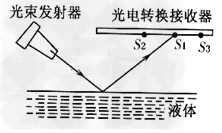问题
填空题
有一种液面微变监视器,基本结构原理如图所示,光束发射器始终以一定角度向被监视的液面发射一束细光;光束经液面反射,其反射光被水平放置的平面光电转换接收器接收,再通过显示器显示出来,反射到光电转换接收器的光点由S 移向S
移向S ,则表明被监视的液面 ;若接收器上接收到的光点由S
,则表明被监视的液面 ;若接收器上接收到的光点由S 移到S
移到S ,则说明被监视的液面 (填“上升”或“下降”)。
,则说明被监视的液面 (填“上升”或“下降”)。

答案
上升 下降
有一种液面微变监视器,基本结构原理如图所示,光束发射器始终以一定角度向被监视的液面发射一束细光;光束经液面反射,其反射光被水平放置的平面光电转换接收器接收,再通过显示器显示出来,反射到光电转换接收器的光点由S 移向S
移向S ,则表明被监视的液面 ;若接收器上接收到的光点由S
,则表明被监视的液面 ;若接收器上接收到的光点由S 移到S
移到S ,则说明被监视的液面 (填“上升”或“下降”)。
,则说明被监视的液面 (填“上升”或“下降”)。

上升 下降